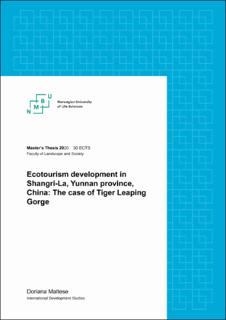| dc.description.abstract | Ecotourism was conceptualized initially in the West as an alternative to mass tourism and with an ecologically benign approach intended to benefit the host community but also to give higher quality experiences to tourists. In China, it was introduced only in the 1990s when green development alongside ecological awareness started to be promoted. It gradually expanded in different regions especially in destinations in southwestern China, which contains a global biodiversity hotspot and a rich cultural heritage. Based on the material gathered from two weeks of fieldwork, this thesis explores the impacts of ecotourism in the case study of Tiger Leaping Gorge, north-west Yunnan. The purpose of this research is to examine the economic, environmental, and socio-cultural impacts of ecotourism from local people's perspectives, as well as to examine residents’ attitudes to ecotourism development. This study employed semi-structured questionnaires, informal discussions, text-chat interviews with key informants and observations in a mixed research methods approach. A theoretical approach of environmental justice, including elements of the community-based ecotourism approach were used when analysing the collected data. The research revealed that an official ecotourism plan was non-existent and that despite being within a UNESCO Heritage Site, there was no initiation of protected status in the area. Although ecotourism has brought some few favourable impacts, especially for the “rural economic elite” involved in tourism-related activities, on the other hand, the research also found several potential economic, environmental and socio-cultural adverse effects. These suggest that ecotourism had not yet made a full contribution to local sustainable development and did not yet represent a different and better livelihood. Moreover, participation in planning and decision-making by the local people was absent, raising issues of distributive, recognition, procedural and capabilities justices. Nevertheless, local people in Tiger Leaping Gorge hold optimistic attitudes about ecotourism, which indicate its feasibility in the future. This thesis concludes that effective regulation and sound planning play a significant role in enabling a better understanding of ecotourism among the residents and its sustainability. Meanwhile, the importance of local people’s active involvement at various levels of ecotourism development in ensuring ecotourism’s success, in the long term, was also revealed. Many of the ecotourism characteristics espoused in the international ecotourism literature, did not find large applicability in China to date, hence the importance of firstly understanding the Chinese historical, environmental and socio-cultural contexts in which policymakers and tourism planners operate. The study concludes with some recommendations developed from suggestions by informants in the communities, tourists, as well as personal observations and ideas based upon the broader literature on ecotourism. | en_US |

